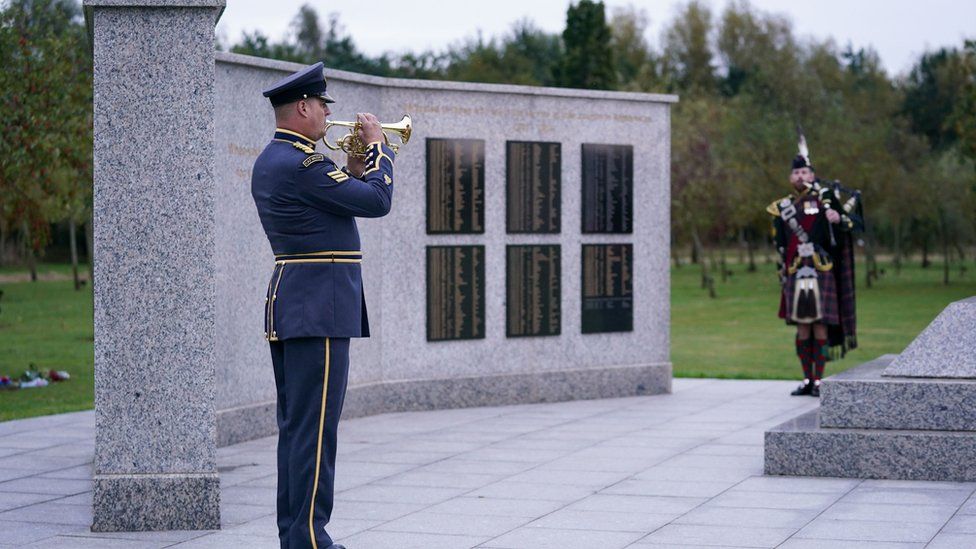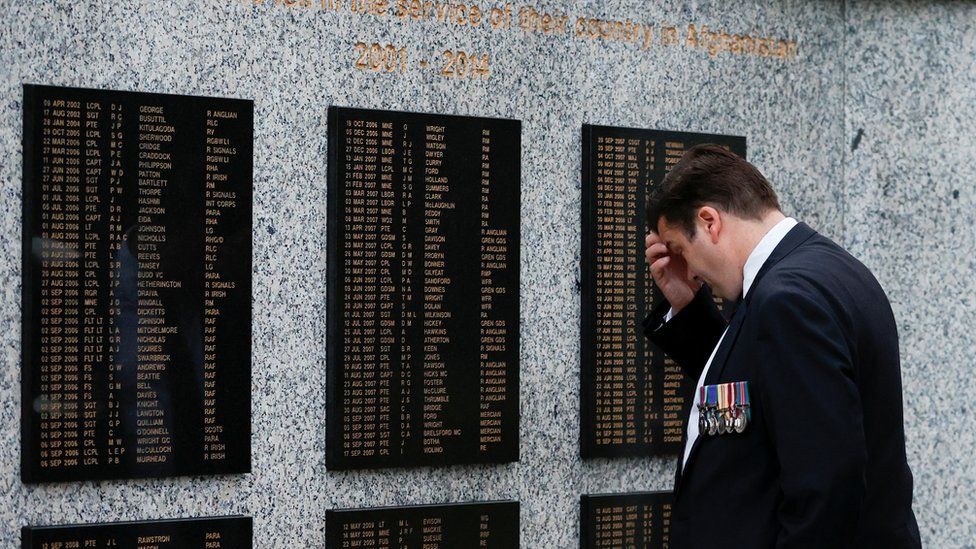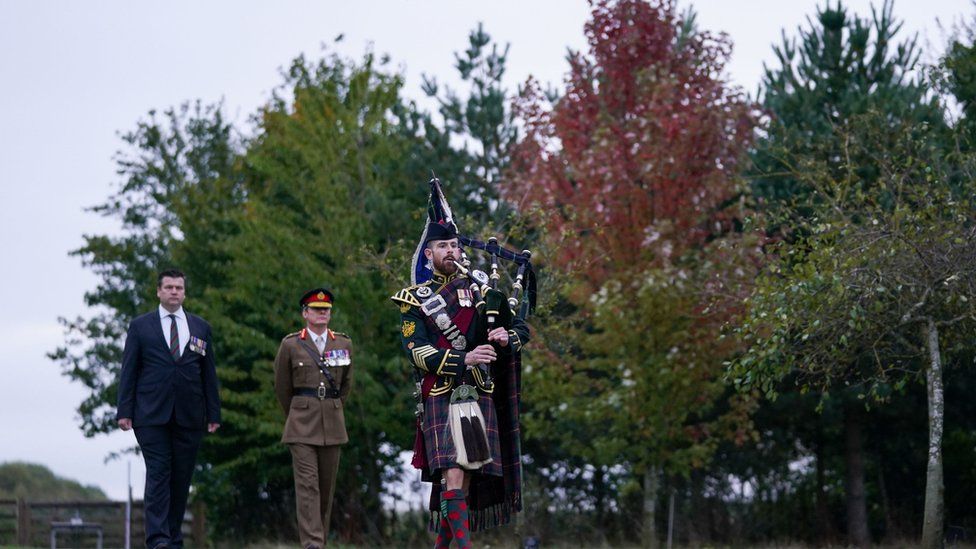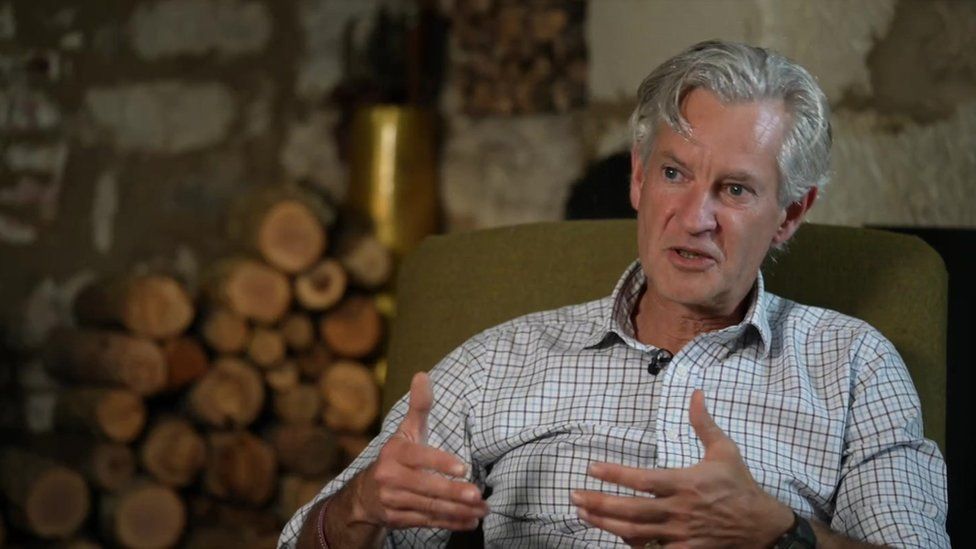Commemorations have been held to mark the 20th anniversary of the start of UK military operations in Afghanistan.
Wreaths were laid in memory of the 457 British personnel killed during the conflict.
UK troops left Afghanistan at the end of August, bringing an end to the 20-year war.
“The hurt never goes away,” said Claire Hill, whose only son James was killed in 2009. “We have to believe he did make a difference.”
The war in Afghanistan began on 7 October 20 years ago, with American-led coalition airstrikes against airports and terrorist training camps, in response to the 11 September terror attacks in the US.
Two small wreath-laying ceremonies took place place at 07:30 BST, intended by the Ministry of Defence to honour “the courage and commitment of its people” during the two decades of conflict.
Wreaths dedicated to those who lost their lives in combat in Afghanistan were laid at the Bastion Memorial at the National Memorial Arboretum in Staffordshire.
At the same time, another wreath was laid at the Iraq and Afghanistan Memorial near the Ministry of Defence in central London.
Piper Major Colour Sgt Peter Grant, who led the procession in Staffordshire, said the service was an important moment to reflect on what had happened in Afghanistan.
Speaking before the service, he told the BBC that having served in Afghanistan, it was “quite emotional” to see the names of people he knew on the wall of the Bastion memorial.
Sgt Grant, who also served as the lone piper at the Duke of Edinburgh’s funeral, said: “It gives me the opportunity to reflect on my time out there, think about the people who have lost their lives, the soldiers who are living with life-changing injuries and also the families who are living through the pain and hardship of losing people out there.”
The commemoration comes as veterans and their families try to reckon with the legacy of the war, having watched the Taliban swiftly regain control of Afghanistan as UK and US forces withdrew.
Nearly 12 years to the day since L/Cpl James Hill died, his parents Claire and Brian are proud of his service and sacrifice, but also acknowledge the pain of seeing the Taliban return.
 IMAGE SOURCE,PA MEDIA
IMAGE SOURCE,PA MEDIA
 IMAGE SOURCE,PA MEDIA
IMAGE SOURCE,PA MEDIA“If we were to say that James’ life is wasted then that would hurt us all over again, because we have to believe he did make a difference,” said Mrs Hill. “They all gave so much. Not just the ones who died but the ones who carry on with injuries.”
James was 23 and about to get married when he was killed by an improvised explosive device in Afghanistan’s Helmand province.
“It never leaves us, we don’t have a son anymore. We don’t have any other children. There’s an emptiness, there’s a hole here that nothing can fill,” Mrs Hill said. “The hurt never goes away.”
“Remembrance Day for most people is 11 November, but for the likes of us Remembrance Day is every day,” said Mr Hill.
Stuart Tootal – a former colonel who commanded 3rd Battalion, the Parachute Regiment – saw the first serious casualties of the war when he led British troops into Helmand in 2006, and a simple peace support operation became a bloody counter-insurgency conflict.

His view of the war now is very clear: “The intent of what we were trying to do was always right. The concept was flawed: too little, too late. And we quit far too soon.
“And that is the great tragedy of Afghanistan.”
While Afghanistan had 20 years to see how life could be different, Mr Tootal adds that the opportunity was never fully realised because the Taliban regained power.
“I don’t think we can be very proud of the outcome. We can be proud of what we tried to do as soldiers,” he said.
“But in terms of those responsible for the strategic decisions, I don’t think there’s a great deal to crow about… There is no victory here. You know, we did not win that conflict.”



No comments:
Post a Comment
Note: only a member of this blog may post a comment.